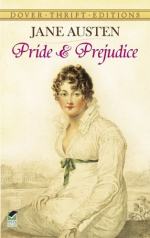|
This section contains 1,892 words (approx. 7 pages at 300 words per page) |

|
Society's Moral Development through Reform in "Pride and Prejudice"
Summary: In "Pride and Prejudice," Jane Austen explores the social mores of marriage in upper-middle class 19th century England as an analogy to how society should develop itself through reform, not revolution, as it matures.
Jane Austen is seen as a social scientist. In her novels she explores, comments and at times reveals the underlying conventions of her immediate society, the upper middle class of 19th century England. In her novel `Pride and Prejudice', Austen does not only depict society and its minor flaws, but provides a hidden etiquette to achieving an ideal society without the `chaos' of revolution. Austen believed in reform, not revolution, as change protects the `best', and revolution destroys everything.
The novel Pride and Prejudice opens with this line: `It is a truth universally acknowledged, that a single man in possession of a good fortune, must be in want of a wife'. This statement is the essence of the novel, as all economic, political and social themes regarded within the novel are somehow encompassed into the one sentence.
The idea of marriage is immediately introduced, setting the tone and...
|
This section contains 1,892 words (approx. 7 pages at 300 words per page) |

|


